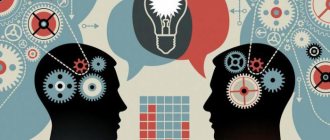What is the social essence of man?
Social essence is a person’s ability to control his instincts, suppress and regulate his desires, engage in meaningful and purposeful activities, and comply with the rules accepted in society. Social essence determines our behavior and the types of activities that we allow ourselves in everyday life.
Among the many biological species inhabiting our planet, man stands out precisely because of his social essence. Of course, many animals also unite in packs and other communities, but they do this under the influence of instincts. People, on the contrary, are able to overcome instincts to fulfill their social roles.
As examples of the manifestation of a person’s social essence, the following can be noted:
- overcoming primitive instincts and “primitive feelings”;
- desire to change the world for the better;
- the need for active activity that is useful for society;
- the ability to improve and overcome one’s weaknesses;
- the ability and need to set goals and achieve them;
- the need for communication and other forms of interaction;
- need for recognition and respect.
If you look at Maslow's pyramid, you will notice that the first two levels are related to the satisfaction of basic biological needs. But the levels located above reflect various aspects of a person’s social essence.
GDZ Paragraph 1. Man is a personality Social studies 6th grade Bogolyubov, Ivanova
Let's check ourselves (pp. 16-17).
- Prove that man is not only a biological, but also a social being.
It grows and develops among people, in human society. Family, school, first children's and then adult society, play, work, learning - everything that surrounds a child, influences him, develops in him certain personality qualities.
- What qualities characterize a personality?
How this person works, how he relates to the world around him, how he evaluates himself, what his abilities are for various activities.
- Think about whether you have strong personality traits and what you have to work on, what you have to cultivate in yourself.
I need to work on my willpower.
- What qualities of a person do these sayings and proverbs speak of: “Measure a hundred times - cut once”, “You can’t pull a fish out of a pond without effort”, “Without patience there is no learning”, “Don’t sit on the stove, you’ll eat rolls”?
- Attentiveness, determination;
- Hard work;
- Perseverance, hard work;
- Hard work.
In the classroom and at home.
- Read the statements. Choose personality traits that you would like to develop. What other positive qualities can you name, and which ones give you negative feelings?
Courage, bravery, bravery are positive human qualities that I would also like to develop. Selfishness and cowardice are negative qualities.
- Express your opinion: who can be called a strong personality? Make a verbal portrait of a strong person. Use these statements.
A strong personality is a strong-willed person, strong nerves, monstrous internal energy, murderous potential; ample opportunities. He can do something that would seem crazy at first glance, but if he has decided, then don’t wait for him without achieving the goal. Usually knows how to wait and wait, manages time correctly.
a) No, this is not a strong personality, because Peter is strong physically, not morally;
b) No, this is not a strong personality, because... a strong personality must be able to admit his guilt and not lie, but Oksana is not able to do this;
c) Yes, this is a strong personality, since only a strong personality can endure difficult life situations without the help of others, and without complaining;
d) Yes, this is a strong personality, because a strong personality can take someone else’s guilt upon himself (take a blow);
- Alexey believes that “weaklings” have no place in life. He tries to prove to his classmates that a strong personality is not afraid of anyone and achieves everything he wants. In front of everyone, Alexey pesters the girls: he pulls their pigtails, hides their briefcases, and paints on their notebooks. And with kids, he is completely “brave”: he can take away breakfast or force them to tie their shoelaces. But for some reason, adults call him an ill-mannered and uncultured person. What is your opinion in this regard? Explain it.
My opinion in connection with Alexey’s behavior is negative.
Alexey has the right desire to become a strong personality. However, there are no correct methods to achieve this goal. The reason is lack of knowledge and lack of education, which is why adults call him an ill-mannered and uncultured person. Alexey needs to be explained and shown ways to become a strong personality. The strength of a person is the ability to help the weak and protect them. After all, only a strong personality is able to resist evil and stand on the side of good and truth. Strength is given to a person to help him when he lacks strength.
Alexey is a born leader. And if someone could tell him kindly, in a friendly way, I’m sure he would understand and be able to become the best in the class and the star of the whole school.
← Previous
Differences between social essence and biological
As we have already found out, man is a biosocial being with a dual nature. The biological essence, which is the result of evolution, is combined in it with the social essence - the product of the development of society. They both have a significant impact on all aspects of human life and behavior. Moreover, each of them has certain features:
- The biological essence is manifested in the fact that a person is an ordinary animal with his own needs and instincts aimed at their realization. The basic biological needs of humans are the maintenance of life, reproduction and protection of offspring.
- The social essence is manifested in the fact that a person, being part of society, is able to control his instincts, suppress and regulate his desires, engage in meaningful and purposeful activities, and follow the rules. Social essence, like personality, is formed in the process of socialization.
Different authors speak differently about the relationship between the biological and social essences of man. Some contrast them, while others consider them closely related. The second point of view is more popular. It implies that a person has a biological essence from birth, but as he grows up and socializes, the social one plays an increasingly important role. At the same time, it is also aimed at realizing human needs, but through adaptation to the complex requirements of human society.
Practical conclusions
1. In the modern world there is a lot of inhumane, cruel, and terrible things. It is all the more important to realize the significance of the human in a person, to understand for yourself what the meaning of life is, what goals are worthy of a person and what are not. Think about which position is closer to you: to be or to have? What is worth living for, and what should you try to avoid in order to preserve the person within you?
2. Remember that man is an open system, many questions do not have an unambiguous answer, but the very search for answers to the mysteries of human nature is an exciting activity for a thinking being. If you are interested in the problems of the essence of man, the meaning of his life, refer to the works of philosophers.
3. Reflecting on eternal philosophical mysteries, do not forget about personal responsibility for the preservation, development and increase of the human in yourself.
The formation of the social essence of man
You've probably heard the saying, "Work made a man out of a monkey." So it's not as meaningless as it seems. Indeed, labor aimed at satisfying one’s own needs and the needs of one’s tribe played a significant role in the transformation of man into a social being. Collaborative labor represented historically the first form of social interaction between people.
Initially, people engaged in joint production - hunting and gathering, then they learned to jointly grow crops and engage in other forms of production. With the advent of material values, which did not arise on their own, but were produced by people, such concepts as property and power began to form.
Over time, social interaction between people in the same tribe, as well as between neighboring tribes, became increasingly diverse. In particular, people realized that they could not only own resources, but also exchange them for those that were needed at the moment. Paleontologists say that people learned to trade and exchange during a period called the “Neolithic Revolution.” It is this event that can be considered the moment of formation of the social essence of man.
Document
From the work of the Russian philosopher S. L. Frank (1877-1950) “The Meaning of Life.”
The question “about the meaning of life” worries and torments deep in the soul of every person. A person can for a while, and even for a very long time, completely forget about it, plunge headlong either into the everyday interests of today, into material concerns about preserving life, about wealth, contentment and earthly success, or into any super-personal passions and “affairs” - in politics, the struggle of parties, etc., but life is already so arranged that even the dumbest, fattest or spiritually sleeping person cannot completely and forever brush it aside: the irreducible fact of the approach of death and its inevitable harbingers - aging and illness, the fact of dying, transient disappearance, immersion in the irrevocable past of our entire life with all the illusory significance of its interests - this fact is for every person a formidable and persistent reminder of the unresolved, put aside question about the meaning of life. This question is not a “theoretical question”, not a subject of idle mental games; this question is a question of life itself, it is just as terrible - and, in fact, even much more terrible than, in dire need, the question of a piece of bread to satisfy hunger. Truly, this is a question of bread that would nourish us and water that would quench our thirst. Chekhov describes somewhere a man who, all his life living with everyday interests in a provincial town, like all other people, lied and pretended, “played a role” in “society”, was busy with “affairs”, immersed in petty intrigues and worries - and suddenly, unexpectedly, one night, he wakes up with a heavy heartbeat and in a cold sweat. What's happened? Something terrible happened - life passed, and there was no life, because there was and is no meaning in it!
And yet, the vast majority of people consider it necessary to brush aside this issue, hide from it, and find the greatest wisdom in life in such “ostrich politics.”
Questions and tasks for the document
1. Why does the question of the meaning of life, according to the philosopher, “excites” and “torments” a person? 2. What human properties are associated with the desire to find meaning in life? 3. How are the question of the meaning of life and the fact that a person is mortal related? Why is this question “non-theoretical” in nature? What do you see as its practical purpose? 4. Do you know the story by A.P. Chekhov, to which the author of the above fragment refers? 5. Why do many people still consider it necessary to “brush aside” the eternal question about the meaning of life? What are the limitations of the “ostrich policy”?
Social personality traits
Personality is a concept that reflects the social nature of a person. That is, this is not just an individual, but a subject of social relations, a member of society, possessing a unique set of socially significant traits. In sociology there are two approaches to the study of personality:
- A person is considered as an active subject, capable of cognizing and changing the world around him, influencing society, assessing himself and his place in society. Within the framework of this approach, social qualities of a person are considered to be those qualities that determine a person’s lifestyle, his self-esteem and his assessment by other members of society.
- Personality is considered as a set of social functions and roles. A person simultaneously performs several functions in different areas of life. Within the framework of this approach, social qualities of an individual are qualities that are formed and developed in the process of interaction with other members of society.
Basic social qualities of a person:
- self-awareness – the ability to be aware of oneself, evaluate one’s actions and understand how others evaluate them;
- self-esteem is a complex characteristic that shows how a person perceives his abilities, capabilities and other characteristics;
- social identification – identification by a person with a certain social group;
- activity – the ability to perform socially significant actions, take initiative when interacting with others;
- interests are the source of motivation necessary for active actions;
- beliefs - moral, ideological, religious and other views that determine a person’s perception of the world around him;
- life goals are global goals that a person perceives as his destiny.
From a psychological point of view, the presence of life goals is a key characteristic of a mature personality . Despite all the variety of possible options, all existing life goals can be grouped into four groups:
- material goods and comfort;
- development and creative activity;
- power and respect;
- spiritual improvement.
Part C
C 5. What meaning do social scientists put into the concept of “personality”?
Using knowledge from the social science course, compose two sentences containing information about the individual.
C 6. Name any two differences between scientific knowledge and everyday (ordinary) knowledge and illustrate each of these differences with an example.
From 7. In the process of preparing for admission to a technical university, a high school student uses textbooks and manuals, solves many problems in mathematics and physics, and participates in olympiads.
In this example, highlight the subject and object, goals and means of activity. What type of activity can this activity be classified as? Explain your answer.
1. Personality, unlike the individual, has
1) rational thinking
2) articulate speech
3) the ability to make moral choices
4) sensory knowledge
2. Properties that reflect the biological nature of a person include
1) the ability to create new tools
2) communication using articulate speech
3) the ability to think abstractly
4) possessing the instinct of self-preservation
3. Man is a unity of three components: biological, psychological and social. The biological component includes
1) structural features of the human body 2) knowledge and skills
3) value orientations 4) behavioral skills
4. To characterize a person as a subject of social relations in science, the concept is used
1) individual 2) personality 3) citizen 4) individuality 5. What trait is common to both humans and animals?
1) ability to set goals
2) presence of psyche
3) following norms of behavior
4) accumulation of knowledge
6. A distinctive feature of the concept “personality” is(are)
1) articulate speech
2) presence of physical needs
3) the ability to take responsibility
4) consciousness and thinking
7. What type of knowledge includes laws, principles, concepts, concepts?
1) everyday experience 2) theoretical knowledge
3) folk wisdom 4) artistic image
8. Absolute truth, as opposed to relative
1) obtained only scientifically
2) is comprehensive knowledge about the subject
3) requires effort to understand
4) contains objective knowledge about the subject 9. Both absolute and relative truth
1) contains objective knowledge about the subject
2) obtained only scientifically
3) can never be refuted
4) is comprehensive knowledge about the subject
10. True knowledge
1) usually practically applicable 2) can only be obtained by science
3) corresponds to the subject of knowledge 4) is always presented in the form of a theory
11. Relative truth, as opposed to absolute
1) is a product of human cognitive activity
2) includes only empirically verified data
3) is distinguished by theoretical validity and evidence
4) represents incomplete reliable knowledge
12. Artistic (aesthetic) knowledge is based on
1) putting forward scientific hypotheses
2) generalization of data obtained experimentally
3) accumulation and generalization of life experience 4) display of the world in artistic images
13. Which of the following characterizes the theoretical level of knowledge?
1) conducting a scientific experiment
2) description of scientific facts
3) generalization of the data obtained
4) observation of individual facts and phenomena
14. Are the following judgments about human freedom true?
A.
Human freedom presupposes the possibility of realizing one’s interests and needs.
B.
The only limitation on a person's freedom is his moral principles.
1) only A is true 2) only B is true 3) both judgments are correct 4) both judgments are incorrect 15. Are the following judgments about the differences between humans and animals true?
A.
Man differs from animals in his ability to transform the environment through his work.
B.
Man differs from animals in his ability to think.
1) only A is true 2) only B is true 3) both judgments are correct 4) both judgments are incorrect
16. What feature distinguishes labor activity from other types of human activity?
1) communication and interaction with partners
2) the presence of an imaginary setting
3) perception of new information about the world
4) satisfaction of material needs
17. Citizen V. really likes to go to the food market near her house. She has long conversations on various topics with sellers. Meanwhile, food for the family is usually purchased by her husband at the supermarket. What needs are primarily realized in the actions of citizen V.?
1) aesthetic 2) ideal 3) economic 4) social
18. Sociological scientists interviewed a group of citizens of different ages, conducting a study on the sources of knowledge acquired by people.
Respondents (citizens participating in the survey) were asked to choose the correct continuation of the phrase from their point of view: “Most of the knowledge we acquire throughout our lives is based on...” The results (in%) presented in the diagram were obtained.
1) respondents believe that scientific research provides more knowledge than life experience 2) the largest percentage of respondents believe that human knowledge is mainly based on life experience
3) folk wisdom, according to a third of respondents, enriches us with knowledge
4) the smallest percentage of respondents spoke in favor of divine revelation as the main source of knowledge
19. True knowledge, as opposed to false,
1) is based on trust in the authority of great scientists
2) is the result of observation
3) corresponds to the subject of knowledge
4) describes the object and phenomena
Self-awareness and self-realization
Self-awareness and self-realization are important “building blocks” of a person’s social essence. Self-awareness is the ability of an individual to understand himself as a person, evaluate his capabilities and abilities, understand and predict how certain actions will be perceived by others, and also take responsibility for his own decisions and actions. It is self-awareness that determines how successfully a person can interact with other members of society.
Self-realization is the process of a person realizing his potential, achieving life and simply important goals. American psychologist Abraham Maslow believed that the need for self-realization is one of the highest human needs (along with self-actualization and self-development). He gave the following definition: self-realization is the fullest use of all talents, abilities and available opportunities to carry out personally significant activities.
Individuality
In the process of personality formation, a person not only learns social norms that unite people, but also realizes his differences from others. Some of the differences between people appear from birth - even babies have different appearances and different temperaments. Over the years, differences in knowledge, skills, worldview, etc. are added to this. This is called individualization - self-determination of an individual, the formation of its unique qualities, worldview, moral and philosophical foundations.
| Individuality , as social science defines it, is a unique psychophysiological structure of a person. A unique complex that consists of temperament, character, intelligence, worldview, abilities and skills, external features, etc. |
This term emphasizes the uniqueness of each individual, his originality. After all, even twins who are exactly the same from a genetic point of view acquire different life experiences over the years, and this entails more and more differences.
We will help you consolidate new material in social studies courses at the Skysmart online school.
What qualities does a person need to achieve his goal?
If you ask any person what helps him achieve his goals and objectives, everyone’s answers will be different - this is such an individual process and depends on a number of circumstances and character, values ingrained in childhood. The qualities of a creative person are inspiration and creativity, while a “down to earth” person needs self-discipline and hard work. What moves some people towards their goal is not even a help to others, everyone has their own path to success and yet there is a standard idea of people about what these qualities should be.
Qualities of a successful person
The external qualities of a person are how he manifests himself in actions and deeds, and these qualities are a reflection of the internal ones. The qualities of a successful person are developed independently and the most important of them is responsibility at all stages of problem solving. Other, no less important personality traits that shape success:
- ingenuity - helps to find non-standard solutions for any kind of problem, from simple everyday problems to resolving business issues;
- positivity - negative thinking has destroyed many good ideas and projects that never came to fruition, because only positive thinking produces results;
- Confidence – stems from positivity and is built up in the process;
- focus on helping people is an important quality of a successful person who understands that today he will help, tomorrow they will help him;
- seeing prospects and calculating results two steps ahead;
- courage - everyone is afraid of the new, the unknown, but only by overcoming your fears can you become successful;
- ambition - no matter how ambitious the plans for the environment may seem, you need to maintain your desire and go towards the goal.









